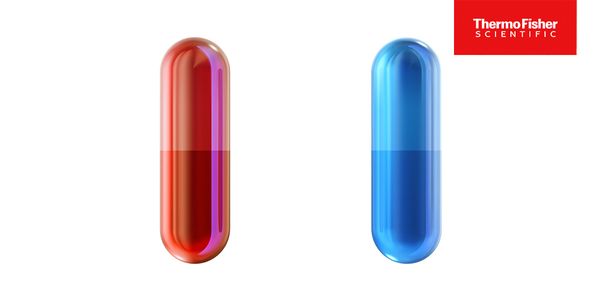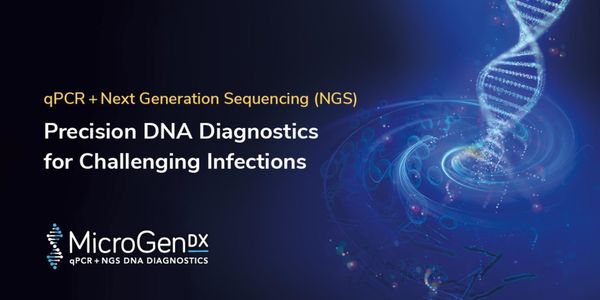Treatment of neurological disorders
Neurological disorders impact the brain, spinal cord, or the nerves. Treatments will differ depending on the type of disease and severity. Treatments for neurological disorders can include medication, brain or spinal cord stimulation, surgery, and physical or occupational therapy.
-
MAR 26, 2024 | 7:00 PMC.E. CREDITSThe implementation of a preemptive pharmacogenomics (PGx) program in a hospital setting requires a multidisciplinary approach to ensure seamless integration of each stage of the process for...Speaker: Steven Melnick. Ph.D., M.D. , Dr. David Mancuso, Pharm.D. CPh , MSPMSponsored By: Thermo Fisher ScientificMAR 26, 2024 | 8:00 AMC.E. CREDITSThe implementation of a preemptive pharmacogenomics (PGx) program in a hospital setting requires a multidisciplinary approach to ensure seamless integration of each stage of the process for...Speaker: Steven Melnick. Ph.D., M.D. , Dr. David Mancuso, Pharm.D. CPh , MSPMSponsored By: Thermo Fisher ScientificJAN 16, 2024 | 8:00 AMThe clinical interpretation of genetic testing results remains one of the most significant hurdles in effectively applying genomics in modern medicine. Errors in variant interpretation, whet...AUG 01, 2023 | 10:00 PMC.E. CREDITSStem cells have the capability to develop into any specialized cell type, which makes them a valuable resource in research and regenerative medicine. Differentiated stem cell models provide...APR 19, 2023 | 8:00 AMDate: April 19, 2023 Time: 8:00am (PDT), 11:00am (EDT), 5:00pm (CEST) Pharmacogenomics is a tool that can assist providers in optimizing drug selection and dosing, help avoid costly adverse...December 15, 2022 8:00 AM PSTDate: October 26, 2022 Time: 9:00am (PST), 12:00pm (EST), 6:00pm (CEST) Current protein biomarkers are only moderately predictive in identifying individuals with mild traumatic brain injury...OCT 19, 2022 | 12:00 PMThe COVID-19 pandemic has affected the lives of most Americans. The consequences on the future health of the nation are unknown but likely profound. Well known is the condition known in the...MAY 04, 2022 | 5:30 AMNeurological manifestations, including headache, altered mental status, and stroke, are a major complication of severe acute respiratory syndrome coronavirus-2 (SARS-CoV-2) infection and cor...APR 26, 2022 | 7:00 AMDate: April 19, 2022 Time: 7:00am (PDT), 10:00am (EDT), 4:00pm (CEST) High-content (HC) phenotypic profiling approaches are a powerful tool to study the effect of biological, genetic, and ch...APR 19, 2022 | 9:00 AMLearning Objectives: 1. Discuss the potential for newborn screening by whole genome sequencing. 2. Review the current evidence for the sensitivity and specificity of newborn screening by who...Speaker: Thomas Defay, PhD , Stephen Kingsmore, PhD, MDPresented at: Genetics Week Virtual Event Series 2022
MAR 10, 2022 | 11:55 PMMajor depression (MDD) is a common psychiatric condition and a leading cause of disability worldwide. While psychotherapy and pharmacotherapy are effective treatments for the majority of peo...MAR 10, 2022 | 11:55 PMWe are in critical need of targeted and individualized treatments for mental health disorders, which affect nearly 50% of Americans during our lifetimes. Brain stimulation treatments, includ...SEP 07, 2021 | 12:00 AMInfection with human immunodeficiency virus (HIV)-1 compromises the immune system and causes in about half of the affected individuals neurological and neurocognitive complication categorize...NOV 05, 2020 | 9:00 AMMore than 50,700 Americans died of opioid overdose in 2019, and more than 1.6 million Americans live with addiction to opioids. Moreover, more than 50 million Americans suffer from chronic p...Speaker: Rebecca G. Baker, PhD , Linda L. Porter, PhD , Jack B. Stein, PhDPresented at: Opioid Crisis Virtual Event Series 2020
NOV 02, 2020 | 8:00 AMDate: November 2, 2020 Time: 8:00am PST. Rapid and accurate microbial diagnostic information can change treatment courses and outcomes for patients inflicted with infections. The limitation...APR 02, 2020 | 7:30 AMLearning Objectives: 1. What kind of virus is the coronavirus? Where is its greatest vulnerability and why? 2. What differentiated the HCoVs discovered in the 1960s from the SARS-CoV and MER...MAR 11, 2020 | 1:30 PMEpisodic memories are essential for human cognition, but the underlying neural mechanisms remain poorly understood. We utilize the opportunity to record in-vivo from human single neurons sim...Speaker: Adam Mamelak, MD , Ueli Rutishauser, PhD , Gabriel Kreiman, PhD , Jie Zheng, PhDPresented at: Neuroscience Virtual Event Series 2020
MAR 11, 2020 | 10:30 AMThe public health burden of Treatment Resistant Depression (TRD) has prompted clinical trials of deep brain stimulation (DBS) that have, unfortunately, produced inconsistent outcomes. Potent...Speaker: Wayne Goodman, MD , Nader Pouratian, MD, PhD , Sameer Anil Sheth, MD, PhDPresented at: Neuroscience Virtual Event Series 2020
MAR 11, 2020 | 9:00 AMThe US Brain Research through Advancing Innovative Neurotechnologies is a research program focused on building fundamental knowledge of how brain circuits process information to enable human...MAR 14, 2019 | 1:00 PMThis presentation will present findings from studies based on Danish nationwide registers investigating the link between all treated infections and the risk of mental disorders. The studies w...MAR 14, 2019 | 12:00 PMThe immune system is linked to an increasing number of medical diseases, including lately also severe mental disorders. Hence, infections, autoimmunity and other immune responses could be inv...MAR 14, 2019 | 11:00 AMBatten disease or the Neuronal Ceroid Lipofuscinoses (NCLss) are each the result of inherited mutations that result in lysosomal dysfunction. Some of these disorders are due to deficiencies i...MAR 14, 2019 | 7:00 AMSubstantial evidence demonstrates that schizophrenia involves a dysregulated dopamine system, potentially driven by overactivity in the hippocampus. Postmortem studies of schizophrenia brains...MAR 14, 2019 | 6:00 AMThe size and burden of mental illness should ideally prompt a strategy of preemption and early intervention. On the neuroscientific side, this leads to the question of brain mechanisms of ris...Speaker: Andreas Meyer-Lindenberg, MD, MSc, MBAPresented at: Neuroscience Virtual Event Series 2019
MAR 26, 2024 | 7:00 PM
C.E. CREDITS
The implementation of a preemptive pharmacogenomics (PGx) program in a hospital setting requires a multidisciplinary approach to ensure seamless integration of each stage of the process for...
Speaker:
Steven Melnick. Ph.D., M.D.
, Dr. David Mancuso, Pharm.D. CPh , MSPM
Sponsored By: Thermo Fisher Scientific
MAR 26, 2024 | 8:00 AM
C.E. CREDITS
The implementation of a preemptive pharmacogenomics (PGx) program in a hospital setting requires a multidisciplinary approach to ensure seamless integration of each stage of the process for...
Speaker:
Steven Melnick. Ph.D., M.D.
, Dr. David Mancuso, Pharm.D. CPh , MSPM
Sponsored By: Thermo Fisher Scientific
JAN 16, 2024 | 8:00 AM
The clinical interpretation of genetic testing results remains one of the most significant hurdles in effectively applying genomics in modern medicine. Errors in variant interpretation, whet...
AUG 01, 2023 | 10:00 PM
C.E. CREDITS
Stem cells have the capability to develop into any specialized cell type, which makes them a valuable resource in research and regenerative medicine. Differentiated stem cell models provide...
APR 19, 2023 | 8:00 AM
Date: April 19, 2023 Time: 8:00am (PDT), 11:00am (EDT), 5:00pm (CEST) Pharmacogenomics is a tool that can assist providers in optimizing drug selection and dosing, help avoid costly adverse...
December 15, 2022 8:00 AM PST
Date: October 26, 2022 Time: 9:00am (PST), 12:00pm (EST), 6:00pm (CEST) Current protein biomarkers are only moderately predictive in identifying individuals with mild traumatic brain injury...
OCT 19, 2022 | 12:00 PM
The COVID-19 pandemic has affected the lives of most Americans. The consequences on the future health of the nation are unknown but likely profound. Well known is the condition known in the...
MAY 04, 2022 | 5:30 AM
Neurological manifestations, including headache, altered mental status, and stroke, are a major complication of severe acute respiratory syndrome coronavirus-2 (SARS-CoV-2) infection and cor...
APR 26, 2022 | 7:00 AM
Date: April 19, 2022 Time: 7:00am (PDT), 10:00am (EDT), 4:00pm (CEST) High-content (HC) phenotypic profiling approaches are a powerful tool to study the effect of biological, genetic, and ch...
APR 19, 2022 | 9:00 AM
Learning Objectives: 1. Discuss the potential for newborn screening by whole genome sequencing. 2. Review the current evidence for the sensitivity and specificity of newborn screening by who...
Speaker:
Thomas Defay, PhD
, Stephen Kingsmore, PhD, MD
Presented at: Genetics Week Virtual Event Series 2022
MAR 10, 2022 | 11:55 PM
Major depression (MDD) is a common psychiatric condition and a leading cause of disability worldwide. While psychotherapy and pharmacotherapy are effective treatments for the majority of peo...
MAR 10, 2022 | 11:55 PM
We are in critical need of targeted and individualized treatments for mental health disorders, which affect nearly 50% of Americans during our lifetimes. Brain stimulation treatments, includ...
SEP 07, 2021 | 12:00 AM
Infection with human immunodeficiency virus (HIV)-1 compromises the immune system and causes in about half of the affected individuals neurological and neurocognitive complication categorize...
NOV 05, 2020 | 9:00 AM
More than 50,700 Americans died of opioid overdose in 2019, and more than 1.6 million Americans live with addiction to opioids. Moreover, more than 50 million Americans suffer from chronic p...
Speaker:
Rebecca G. Baker, PhD
, Linda L. Porter, PhD
, Jack B. Stein, PhD
Presented at: Opioid Crisis Virtual Event Series 2020
NOV 02, 2020 | 8:00 AM
Date: November 2, 2020 Time: 8:00am PST. Rapid and accurate microbial diagnostic information can change treatment courses and outcomes for patients inflicted with infections. The limitation...
APR 02, 2020 | 7:30 AM
Learning Objectives: 1. What kind of virus is the coronavirus? Where is its greatest vulnerability and why? 2. What differentiated the HCoVs discovered in the 1960s from the SARS-CoV and MER...
MAR 11, 2020 | 1:30 PM
Episodic memories are essential for human cognition, but the underlying neural mechanisms remain poorly understood. We utilize the opportunity to record in-vivo from human single neurons sim...
Speaker:
Adam Mamelak, MD
, Ueli Rutishauser, PhD
, Gabriel Kreiman, PhD
, Jie Zheng, PhD
Presented at: Neuroscience Virtual Event Series 2020
MAR 11, 2020 | 10:30 AM
The public health burden of Treatment Resistant Depression (TRD) has prompted clinical trials of deep brain stimulation (DBS) that have, unfortunately, produced inconsistent outcomes. Potent...
Speaker:
Wayne Goodman, MD
, Nader Pouratian, MD, PhD
, Sameer Anil Sheth, MD, PhD
Presented at: Neuroscience Virtual Event Series 2020
MAR 11, 2020 | 9:00 AM
The US Brain Research through Advancing Innovative Neurotechnologies is a research program focused on building fundamental knowledge of how brain circuits process information to enable human...
MAR 14, 2019 | 1:00 PM
This presentation will present findings from studies based on Danish nationwide registers investigating the link between all treated infections and the risk of mental disorders. The studies w...
MAR 14, 2019 | 12:00 PM
The immune system is linked to an increasing number of medical diseases, including lately also severe mental disorders. Hence, infections, autoimmunity and other immune responses could be inv...
MAR 14, 2019 | 11:00 AM
Batten disease or the Neuronal Ceroid Lipofuscinoses (NCLss) are each the result of inherited mutations that result in lysosomal dysfunction. Some of these disorders are due to deficiencies i...
MAR 14, 2019 | 7:00 AM
Substantial evidence demonstrates that schizophrenia involves a dysregulated dopamine system, potentially driven by overactivity in the hippocampus. Postmortem studies of schizophrenia brains...
MAR 14, 2019 | 6:00 AM
The size and burden of mental illness should ideally prompt a strategy of preemption and early intervention. On the neuroscientific side, this leads to the question of brain mechanisms of ris...
Speaker:
Andreas Meyer-Lindenberg, MD, MSc, MBA
Presented at: Neuroscience Virtual Event Series 2019























